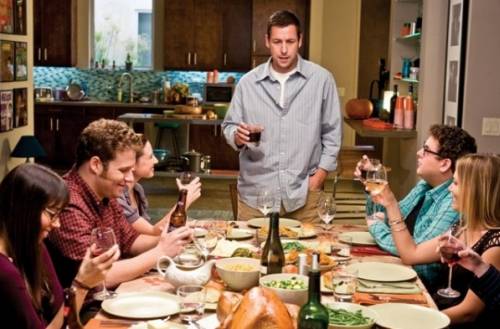 John Tierney, co-author of Willpower, published a column in The NY Times which begins with the declaration that the most “psychologically correct holiday is upon us.” As much as I love Christmas, and as much as the spiritual/religious significance of Easter dwarves all its cousins, I can’t help but agree with him about Thanksgiving here. The article, which will likely set off your self-help alarms, contains more than a few worthy insights on that most Gospel of subjects: gratitude. That is, if you can read between the tips on “how to be more grateful” – which seem to ignore how so much of the power of gratitude lies in it being a response, something that is by definition not terribly receptive to leverage or exertion.
John Tierney, co-author of Willpower, published a column in The NY Times which begins with the declaration that the most “psychologically correct holiday is upon us.” As much as I love Christmas, and as much as the spiritual/religious significance of Easter dwarves all its cousins, I can’t help but agree with him about Thanksgiving here. The article, which will likely set off your self-help alarms, contains more than a few worthy insights on that most Gospel of subjects: gratitude. That is, if you can read between the tips on “how to be more grateful” – which seem to ignore how so much of the power of gratitude lies in it being a response, something that is by definition not terribly receptive to leverage or exertion.
Few people would disagree that gratitude and happiness are pretty close emotional approximations of one another, some of us might go so far as to say it’s pretty close to faith as well. So when Tierney suggests that gratitude even equates to physical wellness, it should come as no surprise. Gratitude bears fruit, period.
As such, the article inadvertently serves as yet another reminder that the Protestant Reformers were really on to something with their notion of Law-Gospel preaching. Namely, that the pulpit is the platform from which people hear, every week, about the goodness of God’s grace in light of human failure, or as NYC preacher Tim Keller is fond of saying, that we are “more troubled than we ever dared believe, but more loved and accepted than we ever dared hope.” In other words, church is a place where people get in touch with (vertical) gratitude on a weekly basis. And that’s enough. Teaching, encouragement, guidance, wisdom, challenge (gulp!) – as important as those things may be, they simply are no match for gratitude. It may sound reductive, but if we were, by the grace of God, able to impart gratitude and gratitude alone, what a gift that would be! In fact, I’m grateful just thinking about it:
[Thanksgiving] has recently become the favorite feast of psychologists studying the consequences of giving thanks. Cultivating an “attitude of gratitude” has been linked to better health, sounder sleep, less anxiety and depression, higher long-term satisfaction with life and kinder behavior toward others, including romantic partners. A new study shows that feeling grateful makes people less likely to turn aggressive when provoked, which helps explain why so many brothers-in-law survive Thanksgiving without serious injury.
Don’t confuse gratitude with indebtedness. Sure, you may feel obliged to return a favor, but that’s not gratitude, at least not the way psychologists define it. Indebtedness is more of a negative feeling and doesn’t yield the same benefits as gratitude, which inclines you to be nice to anyone, not just a benefactor. [ed. note: Theological implications galore!]
In an experiment at Northeastern University, Monica Bartlett and David DeSteno sabotaged each participant’s computer and arranged for another student to fix it. Afterward, the students who had been helped were likelier to volunteer to help someone else — a complete stranger — with an unrelated task. Gratitude promoted good karma. And if it works with strangers ….
“Gratitude is more than just feeling good,” says Nathan DeWall, who led the study at Kentucky. “It helps people become less aggressive by enhancing their empathy. “It’s an equal-opportunity emotion. Anyone can experience it and benefit from it, even the most crotchety uncle at the Thanksgiving dinner table.”
“More than other emotion, gratitude is the emotion of friendship,” Dr. McCullough says. “It is part of a psychological system that causes people to raise their estimates of how much value they hold in the eyes of another person. Gratitude is what happens when someone does something that causes you to realize that you matter more to that person than you thought you did.”…
Contemplate a higher power. Religious individuals don’t necessarily act with more gratitude in a specific situation, but thinking about religion can cause people to feel and act more gratefully, as demonstrated in experiments by Jo-Ann Tsang and colleagues at Baylor University. Other research shows that praying can increase gratitude.

COMMENTS
8 responses to “Attitudes of Gratitude and the Most Psychologically Correct Holiday”
Leave a Reply















I think that in fact, this is the most ‘psychologically correct’ holiday because it inadvertently for a day enters the culture of grace. Gratitude is a profound and sophisticated act, because it acknowledges a gift which will not be repaid. Grace moves us towards a gift culture, where the only currency is gratitude. Thank you for another great post!
Grace is the essence of theology and gratitude is the essence of ethics. – G. C. Berkouwer
A neat quote.
Awesome. Thanks.
Wonderful article, I love the part on law-gospel only when we truly recognize our failure can we really learn true gratitude! So important we are always so focused on our on accomplishments and self reliant idealism that we lose our grip on only on reality but truly how to be thankful to the one who redeemed us all! Thank You DZ!